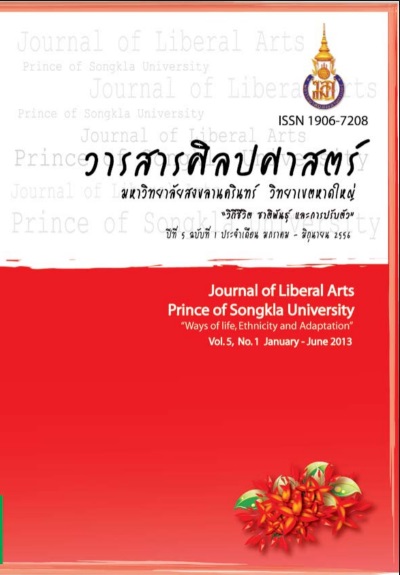The Everyday Life Practice Via Cross-Ethnic Marriage
Keywords:
cross-ethnic marriage, everyday life practice, malay muslims, ethnicity, ethnic identity, marriageAbstract
This research aimed to study the everyday life practice of Thai Buddhists and Malay Muslims in the marriage circle. The research used the qualitative method employing interviews and observations on the key informants who were two married couples living in Hat Yai, Songkhla Province, the first one a Chinese and a Malay Muslim and the second a Thai Buddhist and a Malay Muslim.
The field data were categorized, interpreted, decoded, synthesized and triangulated. The research results revealed that concerning the ethnic identity before marriage, the Malay Muslims’ identity was tied to the religious principles and everyday life practices were based on religious beliefs, culture. The Chinese and The Thai Buddhists have ethnic consciousness. In terms of marriage rituals, it was found than some couples went through the Islamic marriage rituals only and felt that it was complete. One couple arranged for mixed marriage rituals consisting of southern customs of Kin Neo (sticky rice eating), Islamic marriage and grand wedding reception. As for everyday life practice of the couple after the cross-ethnic marriage, the Thai Buddhists crossed the ethnic border by taking up Islam as their religion, changing the way they dress, everyday live practices, beliefs and faiths like not paying respect to images, and eating the food cooked by Muslims. The preservation of ethnic boundary, however, could be seen in that the Thai Buddhists and the Chinese still kept their gratitude, beliefs and faiths like their ancestors did according to their ethnic conscience. The guarding of the boundary was sometimes reduced as could be seen in the loosening of Islamic practices like not praying five times a day, joining the Thai Buddhist funeral to help out with the work without participating in the rituals, and the Chinese’s discarding of the beliefs about Chinese Gods.
Downloads
How to Cite
Issue
Section
License
The authors retain the copyright to their article but the Journal of Liberal Arts, Prince of Songkla University reserves the exclusive rights to first publication.






